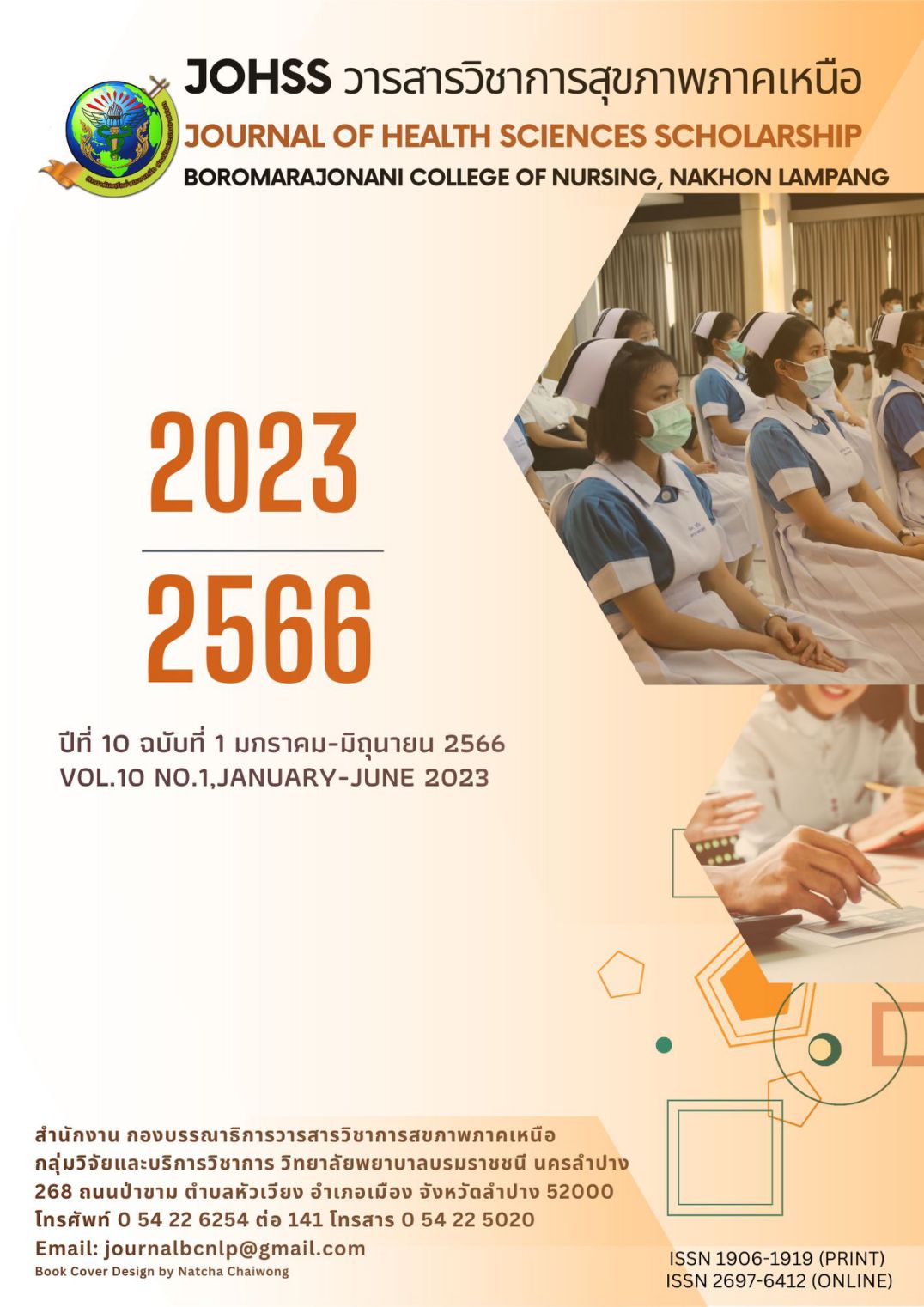การพัฒนาแนวปฏิบัติทางการพยาบาลในการดูแลผู้ป่วยสมองบาดเจ็บ ชนิดไม่รุนแรง ที่เข้ารับการรักษาที่งานผู้ป่วยอุบัติเหตุและฉุกเฉิน โรงพยาบาลสระบุรี
คำสำคัญ:
แนวปฏิบัติทางการพยาบาล, ผู้ป่วยสมองบาดเจ็บ ชนิดไม่รุนแรง, งานผู้ป่วยอุบัติเหตุและฉุกเฉินบทคัดย่อ
การวิจัยนี้เป็นการศึกษาวิจัยและพัฒนา มีวัตถุประสงค์เพื่อพัฒนาแนวปฏิบัติทางการพยาบาลในการดูแลผู้ป่วยสมองบาดเจ็บ ชนิดไม่รุนแรง ที่เข้ารับการรักษาที่งานผู้ป่วยอุบัติเหตุและฉุกเฉิน โรงพยาบาลสระบุรี และศึกษาผลลัพธ์ของการใช้แนวปฏิบัติ ตามกรอบแนวคิดการใช้หลักฐานเชิงประจักษ์ในการพยาบาลของซูคัพ ระหว่างเดือนกันยายน 2565 ถึงเมษายน 2566 ดำเนินการวิจัย 4 ขั้นตอน คือ 1) การค้นหาปัญหา 2) การสังเคราะห์หลักฐานเชิงประจักษ์ 3) นำแนวปฏิบัติการพยาบาลสู่การปฏิบัติ และ 4) การวิเคราะห์อย่างมีวิจารณญาณ เครื่องมือดำเนินการวิจัย ได้แก่ แนวปฏิบัติการพยาบาล และคู่มือปฏิบัติการพยาบาล เครื่องมือเก็บข้อมูล ได้แก่ แบบทดสอบความรู้ แบบประเมินการปฏิบัติ แบบประเมินความพึงพอใจ และแบบประเมินผลลัพธ์ วิเคราะห์ข้อมูลโดยใช้สถิติเชิงพรรณนา และสถิติ Paired t-test
ผลการศึกษา พบว่า หลังการใช้แนวปฏิบัติการพยาบาลในการดูแลผู้ป่วยสมองบาดเจ็บ ชนิดไม่รุนแรง ที่เข้ารับการรักษาที่งานผู้ป่วยอุบัติเหตุและฉุกเฉิน โรงพยาบาลสระบุรี พยาบาลวิชาชีพ มีความรู้เพิ่มขึ้นอย่างมีนัยสำคัญทางสถิติ (p<.05) มีการปฏิบัติตามแนวปฏิบัติ ร้อยละ 100 และมีระดับความพึงพอใจต่อการใช้แนวปฏิบัติ ผู้ดูแลมีความรู้ในการดูแลผู้ป่วยเพิ่มขึ้นอย่างมีนัยสำคัญทางสถิติ (p<.05) รวมถึงไม่พบอุบัติการณ์การเข้ารับการรักษาซ้ำ อัตราการเกิดเลือดออกในสมอง และอัตราเข้ารับการรักษาในหอผู้ป่วย
เอกสารอ้างอิง
Champueng, P. (2020). Factors Associated with Intracranial Hemorrhage in Mild Traumatic Brain Injury Patients with Moderate Risk at King Narai Hospital. Singburi Hospital Journal, 30(2), 1-13. (in Thai)
Dewan, M. C., Rattani, A., Gupta, S., Baticulon, R. E., Hung, Y. C., Punchak, M., Agrawal, A., Adeleye, A. O., Shrime, M. G., Rubiano, A. M., Rosenfeld, J. V., & Park, K. B. (2018). Estimating the global incidence of traumatic brain injury. Journal of neurosurgery, 1-18.
Division of Non Communicable Disease. (2011). The report head injury and the dead from motorcycle accidents. Retrieved 15 May 2023, from https://shorturl.asia/kD5nq. (in Thai)
Jiamsaku S., Prachusilpa G. (2017). A Study Of Nursing Outcomes Quality Indicators For Patients With Neurosurgery, Journal of The Royal Thai Army Nurses, 18(suppl.1), 147–154. (in Thai)
Khumpakam, S., Choomjam, B., Roungsri, W., Janphete, N., Keienukul, N. (2020). Peripheral Intravenous Infusion Nursing Care System Development in Nopparatrajathanee Hospital. Journal of Nursing Division, 49(2), 37-52. (in Thai)
Kochaipath, P., & Intarit, L. (2019). The development of nursing care model for traumatic brain injury patients in community hospital. Journal of Phrapokklao Nursing College, 30(2), 203-218. (in Thai)
Laptavee, B., & Mamom, J. (2015). Factors Predicting Monitoring and Preventive Care of Intracranial Hemorrhage among Mild Head Injury Patients in Thammasat University Hospital. Thai Science and Technology Journal, 23(6), 1023-1032. (in Thai)
Panyangam, A., Sukonthasarn, A., Wangsrikhun, S. (2017). Effects of Emergency Department Discharge Planning for Persons with Mild Traumatic Brain Injury on Caregivers’ Knowledge and Practices. Nursing Journal, 44(1), 86-98. (in Thai)
Pearkao C., & Khunjamnongpak S. (2021). Patient Outcomes After Application of Clinical Nursing Practice Guideline for Mild Traumatic Brain Injury Patients, Songklanagarind Journal of Nursing, 41(4), 15-26. (in Thai)
Pensri R. (2021). A development of nursing care model for road accident head injury patients in Srisangworn hospital, Sukhothai province Thailand.Research and Development Health System Journal, 14(3), 83-96. (in Thai)
Rooplor, S., Leethong-in, L., Piyawattanapong, S. (2021). Effects of the Self-Efficacy Enhancing Program on the Practice Behavior of Caregivers for the Older Patients with Mild Traumatic Brain Injury after Discharge and Post-concussion Syndrome. Srinagarind Med J, 36(5), 617-624. (in Thai)
Salarvand, S., Hemati, S., Adibi, P., Taleghani, F., & Saleki, M. (2020). An Innovative Approach to Clinical Practice Guideline Adaptation in the Nursing Profession in a Developing Country. Cancer management and research, 12, 2255–2264.
Saraburi hospital of medical record. (2023), Annual performance report 2023. Saraburi hospital. (in Thai)
Soukup SM. (2000). Evidence-based Practice Model Promoting the Scholarship of Practice. In SM Soukup &CF Beason Eds. Nursing Clinic of North America. Philadelphia: WB Saunders.
Suwanpitak, W., Vipavakarn, S., Prakeetavatin, B. (2017). Development of Clinical Nursing Practice Guideline for Patients with Mild Traumatic Brain Injury in Krabi Hospital, The Southern College Network Journal of Nursing and Public Health, 4(2), 140-156. (in Thai)
Sukswang, S. (2018). Triage nurse: Beyond main process through practice, Journal of Health Sciences Scholarship, 5(2), 1-14. (in Thai)
Thaweekhoon, R., & Pearkao, C. (2019). Effects of a Smartphone Application on Knowledge Discharge Outcome among Patients with Mild Traumatic Brain Injury. Journal of The Royal Thai Army Nurses, 20(2), 272-279. (in Thai)
The Joanna Briggs Institute. (2014). Reviewers’ Manual 2014 Edition. Australia: Solito Fine Colour Printers. Retrieved 1 May 2022 from http: www.joannabriggs.org/assets/ docs/sumari/reviewers manual-2014.pdf
The Royal College of Neurological Surgeons of Thailand. (2019). Clinical Practice Guidelines for Traumatic Brain Injury, 2019. Samut Prakan: Prosperous plus company limited. (in Thai)
ดาวน์โหลด
เผยแพร่แล้ว
ฉบับ
ประเภทบทความ
สัญญาอนุญาต
ลิขสิทธิ์ (c) 2023 วิทยาลัยพยาบาลบรมราชชนนี นครลำปาง

อนุญาตภายใต้เงื่อนไข Creative Commons Attribution-NonCommercial-NoDerivatives 4.0 International License.
บทความ ข้อมูล เนื้อหา รูปภาพ ฯลฯ ที่ได้รับการตีพิมพ์ในวารสารวารสารวิชาการสุขภาพภาคเหนือ ถือเป็นลิขสิทธิ์ของวารสารวารสารวิชาการสุขภาพภาคเหนือ หากบุคคลหรือหน่วยงานใดต้องการนำทั้งหมดหรือส่วนหนึ่งส่วนใดไปเผยแพร่ต่อหรือเพื่อกระทำการใดๆ จะต้องได้รับอนุญาตเป็นลายลักอักษรจากวารสารวารสารวิชาการสุขภาพภาคเหนือก่อนเท่านั้น
เนื้อหาและข้อมูลในบทความที่ลงตีพิมพ์ในวารสารวิชาการสุขภาพภาคเหนือถือเป็นข้อคิดเห็นและความรับผิดชอบของผู้เขียนบทความโดยตรงซึ่งกองบรรณาธิการวารสาร ไม่จำเป็นต้องเห็นด้วย หรือร่วมรับผิดชอบใดๆ
อนึ่ง ข้อความและข้อคิดเห็นต่างๆ เป็นของผู้เขียนบทความนั้นๆ ไม่ถือเป็นความเห็นของวารสารฯ และวารสารฯ ไม่จำเป็นต้องเห็นด้วยกับข้อความและข้อคิดเห็นใดๆ ของผู้เขียน วารสารฯ ขอสงวนสิทธิ์ในการพิจารณาตีพิมพ์ตามความเหมาะสม รวมทั้งการตรวจทานแก้ไขหรือขัดเกลาภาษาให้ถูกต้องตามเกณฑ์ที่กำหนด



